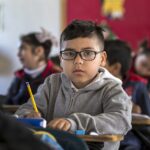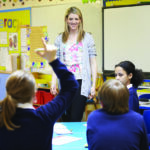Allison Elfreth
 Hi! I am Allison Elfreth and I have been teaching biology for over 10 years. I have my Master of Arts in Education from Teachers College Columbia University, my Master of Science in Biology from Tufts University, and I am a Doctorate of Education Candidate for Curriculum and Instruction in Science Education at Indiana University. I feel fortunate be able to work in a field that combines my two passions, science and education, and I have been wanting to extend my knowledge and experience to other professionals. I have had a particular interest in exploring methods for engaging all students through the implementation of providing meaningful feedback, using phenomena in the classroom, making learning and thinking visible, and employing the universal design for learning framework.
Hi! I am Allison Elfreth and I have been teaching biology for over 10 years. I have my Master of Arts in Education from Teachers College Columbia University, my Master of Science in Biology from Tufts University, and I am a Doctorate of Education Candidate for Curriculum and Instruction in Science Education at Indiana University. I feel fortunate be able to work in a field that combines my two passions, science and education, and I have been wanting to extend my knowledge and experience to other professionals. I have had a particular interest in exploring methods for engaging all students through the implementation of providing meaningful feedback, using phenomena in the classroom, making learning and thinking visible, and employing the universal design for learning framework.
In my free time I love to play with my three-year old son, take ballroom dancing lessons with my husband, cook, relax at the beach, explore Suffolk (as I grew up in Nassau), and spend time with friends and family.
I look forward helping other professionals in their educational goals and I hope you check out my course offerings!
Check out my course offerings:
Courses |
|---|
 Providing Meaningful Student Feedback in a Timely Manner Providing Meaningful Student Feedback in a Timely Manner(3credits/45hours) In-service credit only ON-LINE
Instructor: Allison Elfreth
Email: AElfrethliips@gmail.com
Course Description: The number of responsibilities a teacher has in a given day can be extensive, from writing up engaging lesson plans, putting in grades and attendance, responding to parent emails, attending CSE meetings, organizing after school club activities, developing effective assessments, and more. In addition to all of these responsibilities, we need to find some time to teach! But as any of us know, teaching does not just entail delivering a lesson for 40 minutes. We need to ensure our lessons are engaging all students, differentiated to meet the needs of all, and effectively preparing students to understand and apply the content they are learning. Part of that needs to include providing students with meaningful feedback. Feedback is “information provided by an agent regarding aspects of one’s performance and understanding” and is an essential part of the learning process. Feedback provides students with a clear understanding of the subject of interest; and if employed appropriately it not only gives students clear guidance for improving learning, but it also provides them with confidence. Of course, in order for feedback to be effective it must also be given in a timely manner; and therefore, we as teachers need to plan for providing feedback. We cannot expect that it is something we will just squeeze into our day. Instead, we need to be intentional about our feedback and carve out time for implementing feedback into our grading and into our lessons. Yet it is possible to make feedback a seamless part of everyday learning. John Hattie and Helen Timperley from the University of Auckland famously wrote The Power of Feedback in which they classify the purpose of feedback as “reducing the discrepancies between current understandings/performance and a desired goal.” We will use this reading, John Hattie’s principles of Visible Learning, and the online tool of GrokSpot as we delve into
• Characteristics of effective feedback and the three feedback questions
• The four levels of feedback and how feedback can improve self-efficacy and student confidence
• GrokSpot online tool for making feedback a seamless part of everyday learning
• Time-saving strategies for efficient grading feedback
• The use of rubrics to provide feedback and Google Classroom rubrics
• The benefits of peer- and self- assessment $250.00$280.00 Buy here |
 Using Phenomena-Based Learning in the Science Classroom Using Phenomena-Based Learning in the Science Classroom(3 credits/45 hours) in-service credit only
Instructor: Allison Elfreth Email: AElfrethliips@gmail.com
Course Description: Phenomena has been the new buzz word in education ever since Finland made Phenomena-Based Learning compulsory starting in 2016. At its core, phenomena-based learning is intended to be a cross-disciplinary form of teaching that enables students to understand the connections between multiple disciplines and how those disciplinary knowledges can be used together to solve problems. Practically, unless a school culture devotes itself to providing time in the day for students to participate in a multidisciplinary PhenoBL module as done in Finland, phenomena-based learning can and must be done in a given subject area. Phenomena are simply observable events, and they need not be phenomenal. The phenomena should have a real-world context which is how we can begin to engage all students. Similar to project-based learning and problem-based learning, students are expected to work together to ask questions and find solutions to those questions. We will explore the following
$250.00$280.00 Buy here |
 Universal Design for Learning to Engage All Students Universal Design for Learning to Engage All Students(3 Credits/45 Hours) In Service Credits only
Instructor: Allison Elfreth Email: AElfrethliips@gmail.com
Course Description: UDL, or universal design for learning, is a framework for teaching geared toward accommodating the needs and abilities of all learners. Using UDL, the learning goals are the same for all students while the teacher provides different ways for these goals to be achieved. UDL is not the same as differentiated instruction, as UDL proactively aims to provide options that makes the lesson accessible to all learners, differentiated instruction is a reactive process in which adjustments are made based on the individual’s needs. UDL is meant to remove the barriers to learning and encourage students to self-differentiate by choosing the best path for themselves. We will explore
• What Universal Design for Learning is and how it can engage all students
• How UDL develops expert learners
• Using BrainPOP as a tool for UDL
• Learner variability and the Myth of Average
• The multiple means of representation, engagement, and action and expression $250.00$280.00 Buy here |
 How to Conquer Behavior Challenges in Your Classroom How to Conquer Behavior Challenges in Your ClassroomKim Kittredge Kkittredgeliips@gmail.com The challenging student will always be in your classroom, and teachers will always be looking for a way to deal with them. In this course educators will be given strategies on how to deal with their most challenging students on a day-to-day basis. Educators will be taught various skills on conquering behavioral challenges in and out of their classrooms. Skills such as behavior interventions and management, behavior support, how to properly implement an IEP will be discussed. Teachers will also learn the importance of social skills, modeling techniques, effective praise in the classroom and the importance of developing proper daily routines. Educators will also work on how to support and sustain proper relationships with parents of behavioral students. This course is a must for all educators of all grades K-12. $250.00$280.00 Buy here |
 Increasing Rigor and Productivity in Your Students Increasing Rigor and Productivity in Your StudentsKim Kittredge Kkittredgeliips@gmail.com How can teachers increase rigor and productivity in the classroom? This course is designed to arm educators with a multitude of skills to increase rigor and make your students become the motivated individuals you wish them to be. Participants in the course will be given a multitude of materials and strategies to help their students become more productive. Through hands-on activities, group work, SEL learning, computer-based games and technology and differentiated instruction to name a few, your students will thrive. Students who didn’t think they had it in them will break the barriers and understand that rigor is not “hard” it’s just a tiny bit uncomfortable; but the benefits are powerful! This course is a must for all educators of all grades K-12. $250.00$280.00 Buy here |
 My Environment, My School: Think Green, Act Green! My Environment, My School: Think Green, Act Green!Ways to save the environment are all around us. So, how do we share this with our students, our classroom, our school community? This course is designed to offer educators insight into creating the most environmentally friendly spaces. Educators will be offered strategies for their classrooms and lessons for their students to help them be more environmentally conscious. Teachers will be able to make healthier choices for their students, their classrooms, and school community which will help them and our planet. This course will analyze the effect of the daily choices we make, technological advances, gardening energy consumption, global warming and the effect of pollution and agriculture. Students will examine these choices and their effects on our worldwide ecosystem. Additionally, students will be asked to examine their own behaviors and actions and find a way to make better choices for themselves, their school community and their world. This course is a must for all educators of all grades K-12. $250.00$280.00 Buy here |
 Recipe for Success: Teaching Reading and Writing Recipe for Success: Teaching Reading and WritingKim Kittredge Kkittredgeliips@gmail.com Do you ever wonder what some of the ingredients are that go into the successful teaching of reading and writing? Both reading and writing comprehension are both complex processes that require lots of effort and various skills. Some of these skills are often completely neglected while a child follows traditional teaching methods. As a result, reading and writing often become a cause for a student’s anxiety and frustration. In this course educators will be given new, innovative and fun techniques for reading and writing teaching methods. From journaling, to writing projects, to guided reading, or reading with purpose, educators will find the tools to create the perfect recipe for their students to be successful. By the end of this course teachers will be armed with enough “food for thought” to help them be the best teachers of reading and writing they can be. This course is a must for educators of all grades and levels K-12. $250.00$280.00 Buy here |
